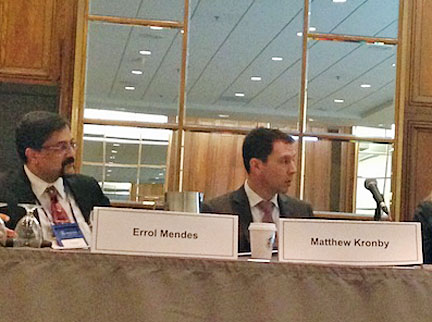Multinational companies must create effective grievance systems for the communities in which they do business, says University of Ottawa law professor Errol Mendes.
 Lack of access to remedies for local complainants is a “gaping hole” in due diligence by companies doing business overseas, said Mendes, a former United Nations adviser on corporate social responsibility.
Lack of access to remedies for local complainants is a “gaping hole” in due diligence by companies doing business overseas, said Mendes, a former United Nations adviser on corporate social responsibility.
Mendes, who spoke at the Ontario Bar Association’s annual conference in Toronto yesterday, told lawyers designing effective complaint mechanisms for local communities can ultimately help avoid lawsuits.
While Canadian multinational companies had previously been able to avoid lawsuits at home by claiming jurisdictional restrictions, the 2013 Ontario Superior Court ruling in Choc v. Hudbay Minerals Inc. changed that. The judge ruled the case of Guatemalan workers, who allege rape and murder on a property owned by a Canadian mining company’s subsidiary, can be heard in Ontario.
Mendes says doing due diligence isn’t just a matter of corporate social responsibility.
“It’s strategic business management,” he said. “You absolutely have to have risk management strategies to deal with people.”
But when it comes to doing this due diligence, “nobody is doing it right,” he said, adding companies should do extensive pre-investment risk assessment.
That assessment should include the company’s proximity to violence, crime, terrorism, and ethnic violence. If those things are present at close proximity, “you should seriously consider not making the investment,” Mendes noted.
Still, once companies have done an initial assessment, they “start drinking their own Kool-Aid,” he said, noting the risk assessment must be on-going.
Part of fulfilling corporate social responsibility is ensuring companies are aware of anti-corruption laws, said Matthew Kronby, an international trade lawyer at Bennett Jones LLP.
Most developed and developing countries have come to realize bribery is not “just how things are done,” said Kronby, adding it wasn’t long ago that payments to foreign government officials were considered another cost of doing business.
Under most foreign corruption laws, “You don’t need to give a bribe to commit the offence, there only has to be a conspiracy to give or offer a bribe,” he said.
And the bribe does not have to be monetary. “Doing it indirectly doesn’t get you or your client off the hook.”
While there are exceptions for “reasonable gifts,” giving a Rolex watch isn’t considered modest while a calendar might be acceptable, he pointed out.
 Lack of access to remedies for local complainants is a “gaping hole” in due diligence by companies doing business overseas, said Mendes, a former United Nations adviser on corporate social responsibility.
Lack of access to remedies for local complainants is a “gaping hole” in due diligence by companies doing business overseas, said Mendes, a former United Nations adviser on corporate social responsibility.Mendes, who spoke at the Ontario Bar Association’s annual conference in Toronto yesterday, told lawyers designing effective complaint mechanisms for local communities can ultimately help avoid lawsuits.
While Canadian multinational companies had previously been able to avoid lawsuits at home by claiming jurisdictional restrictions, the 2013 Ontario Superior Court ruling in Choc v. Hudbay Minerals Inc. changed that. The judge ruled the case of Guatemalan workers, who allege rape and murder on a property owned by a Canadian mining company’s subsidiary, can be heard in Ontario.
Mendes says doing due diligence isn’t just a matter of corporate social responsibility.
“It’s strategic business management,” he said. “You absolutely have to have risk management strategies to deal with people.”
But when it comes to doing this due diligence, “nobody is doing it right,” he said, adding companies should do extensive pre-investment risk assessment.
That assessment should include the company’s proximity to violence, crime, terrorism, and ethnic violence. If those things are present at close proximity, “you should seriously consider not making the investment,” Mendes noted.
Still, once companies have done an initial assessment, they “start drinking their own Kool-Aid,” he said, noting the risk assessment must be on-going.
Part of fulfilling corporate social responsibility is ensuring companies are aware of anti-corruption laws, said Matthew Kronby, an international trade lawyer at Bennett Jones LLP.
Most developed and developing countries have come to realize bribery is not “just how things are done,” said Kronby, adding it wasn’t long ago that payments to foreign government officials were considered another cost of doing business.
Under most foreign corruption laws, “You don’t need to give a bribe to commit the offence, there only has to be a conspiracy to give or offer a bribe,” he said.
And the bribe does not have to be monetary. “Doing it indirectly doesn’t get you or your client off the hook.”
While there are exceptions for “reasonable gifts,” giving a Rolex watch isn’t considered modest while a calendar might be acceptable, he pointed out.







